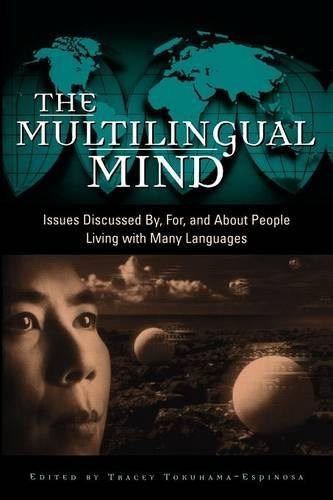
The Multilingual Mind: Issues Discussed by, for, and about People Living with Many Languages
(Paperback)
Available Formats
Publishing Details
The Multilingual Mind: Issues Discussed by, for, and about People Living with Many Languages
By (Author) Tracey Tokuhama-Espinosa
Bloomsbury Publishing PLC
Praeger Publishers Inc
30th March 2003
United States
Classifications
General
Non Fiction
Educational: First / native language
404.2
Physical Properties
Paperback
312
Width 156mm, Height 235mm
482g
Description
The bulk of the world's population is multilingual, and one in seven Americans speak a language other than English at home. Multilinguals crave answers to question both basic and profound, questions relating to linguistic identity, schools, multiliteracy, how languages are actually learned, and why there are so many variations on individual success. Tokuhama-Espinosa combines solid research, humor, and real-life examples into 21 informative and entertaining essays about people who experience the world with multiple languages. This book tackles common misconceptions about polyglots (too many languages can cause brain overload, some languages are easier to learn than others, an adult cannot learn a foreign language as fast as a child, etc.) Other topics include: Curriculum choice Teaching languages using the multiple intelligences How different education systems can influence multilingual skills Language's relationship to mental tasks such as music and math Languages from the womb and bilingualism from birth The growth of the trilingual family The societal situation of third culture kids (those growing outside of their parents' native country) A special case for foreign language development The emerging cross-area study of multilingualism and cosmopolitanism Questions of linguistic identity Challenges to normal foreign language learning, such as dyslexia, Downs Syndrome, and deafness
Reviews
"I am absolutely delighted in anticipating that there will be a book that I can place in the hands of parents and educators that responds clearly to the challenge of multilingualism in its various contexts. Tracey has done all of us a great service in pulling these authors with personal experience and academic credentials together to speak with clarity to the issues of the multilingual mind."-David Pollock Executive Director, Interaction International Inc.
"The Multilingual Mind is an important resource for anyone interested in the latest thinking on the topic. Warm and welcoming, it offers guidance and insight to parents, teachers, and multilingual adults alike, as well as to monolinguals who may choose to engage this adventure we call multilingualism."-Barbara F. Schaetti, Ph.D. President, Transition Dynamics
"The Multilingual Mind offers a realistic and very pragmatic approach to multilingualism. This book is a wonderful tool for both parents and teachers and affirms what research and experience tell us about people's ability to learn languages. This work should become part of the educational mainstream, as learning languages opens us to becoming more culturally sensitive, a skill that is essential in today's globalized world."-Pilar Cabeza de Vaca Head, The American School in Paris
"This series of excellent essays speaks to the heart of a language school in Geneva, the crossroads of so many cultures and languages. An excellent balance of sound scientific knowledge and practical personal experience."-Pamela Walsh OBE Director General & Founder of ASC International House Language School
"Tracey Tokuhama-Espinosa has carved a niche for herself in the field of multilingual research with this volume. Reflecting upon her personal journey as a multilingual educator, she has successfully edited and compiled an eclectic body of essays dealing with issues ranging from myths on multilingualism to social and individual language learner differences. By uniting a heterogeneous group of researchers and writers, Tokuhama-Espinosa provides an insightful overview of the dimensions of multilingualism equally appealing to newcomers or well-established researchers in the field....[a]n open road map for further paths of research in multilingual education."-International Journal of Multilingualism
[r]elevance for anyone interested in better understanding the role of language in shaping identity. Particularly informative is the research on language learning in challenging situations such as Down's syndrome, deafness, dyslexia, or in cross-cultural adoptions. Summing Up: Highly recommended. Parents, students, teachers, and researchers interested in the study of bilingualism and multilingualism. Lower-division undergraduates and above.-Choice
Tracey Tokuhama-Espinosa has carved a niche for herself in the field of multilingual research with this volume. Reflecting upon her personal journey as a multilingual educator, she has successfully edited and compiled an eclectic body of essays dealing with issues ranging from myths on multilingualism to social and individual language learner differences. By uniting a heterogeneous group of researchers and writers, Tokuhama-Espinosa provides an insightful overview of the dimensions of multilingualism equally appealing to newcomers or well-established researchers in the field....[a]n open road map for further paths of research in multilingual education.-International Journal of Multilingualism
"relevance for anyone interested in better understanding the role of language in shaping identity. Particularly informative is the research on language learning in challenging situations such as Down's syndrome, deafness, dyslexia, or in cross-cultural adoptions. Summing Up: Highly recommended. Parents, students, teachers, and researchers interested in the study of bilingualism and multilingualism. Lower-division undergraduates and above."-Choice
"[r]elevance for anyone interested in better understanding the role of language in shaping identity. Particularly informative is the research on language learning in challenging situations such as Down's syndrome, deafness, dyslexia, or in cross-cultural adoptions. Summing Up: Highly recommended. Parents, students, teachers, and researchers interested in the study of bilingualism and multilingualism. Lower-division undergraduates and above."-Choice
Author Bio
TRACEY TOKUHAMA-ESPINOSA is a native of California who received her Master's of Education at Harvard University and has taught in international schools in Japan, Ecuador, France, and Ecuador. She is currently Professor of Education, Psychology, and Cognitive Sciences at the University of San Francisco de Quito in Ecuador. Tracey has given numerous workshops on raising multilingual children to schools and families in Australia, Norway, Germany, Italy, Switzerland, the Netherlands, France, Ecuador, and England. She speaks and writes in English and Spanish fluently, knows conversational French, some Japanese, and is studying basic German. She and her husband are raising their three children in four languages.
